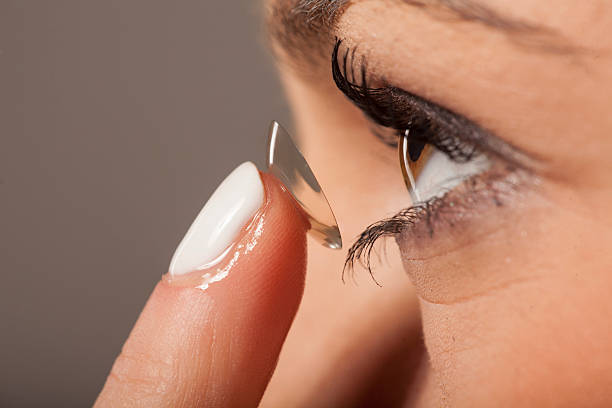When it comes to vision correction, you have two main choices: contact lenses or glasses. Both options effectively improve your eyesight, but which one is better for your eyes? The right choice depends on several key factors, including your lifestyle, comfort preferences, budget, and overall eye health.
Glasses are often easier to maintain, reduce the risk of eye infections, and can be a stylish accessory. On the other hand, contact lenses offer a wider field of vision, provide more freedom for active individuals, and eliminate the hassle of fogging or slipping frames.
In this comprehensive guide, we’ll break down the pros and cons of contacts vs. glasses so you can make an informed decision that best suits your daily routine and vision needs.

The Benefits of Wearing Glasses
Glasses are one of the most popular and effective ways to correct vision. Whether you are nearsighted, farsighted, or have astigmatism, prescription glasses offer a simple and convenient solution. Here are some key reasons why glasses might be the best choice for you:
1. Easy to Use
Glasses are hassle-free—just put them on and take them off as needed. Unlike contact lenses, they don’t require touching your eyes, which reduces the risk of infections and irritation. This makes them a great option for people with sensitive eyes or those who prefer a low-maintenance vision correction method.
2. Less Eye Irritation
Since glasses sit on your nose rather than directly on your eyes, they help prevent dryness, discomfort, and irritation. This is especially beneficial for individuals who suffer from dry eye syndrome, allergies, or frequent eye redness.
3. Built-in Eye Protection
Glasses act as a protective shield against dust, wind, and debris, helping to keep your eyes comfortable throughout the day. Additionally, choosing lenses with UV protection can help block harmful sun rays, reducing your risk of eye damage. Many glasses also come with blue light filtering options to minimize digital eye strain from screens.
4. Cost-Effective in the Long Run
Although the initial cost of glasses can be high, they often last for years with proper care. Unlike contact lenses, which require ongoing purchases, a durable pair of glasses can be a more affordable long-term investment.
5. A Stylish Accessory
Glasses are more than just a vision aid—they’re a fashion statement! With countless styles, colors, and frame designs available, you can choose a pair that complements your personality and enhances your overall look. Whether you prefer a classic, trendy, or bold style, glasses offer a unique way to express yourself.

The Benefits of Wearing Contact Lenses
Contact lenses are a popular alternative to glasses, offering convenience, comfort, and a natural look. Whether you need vision correction for nearsightedness, farsightedness, astigmatism, or presbyopia, contacts provide a versatile solution. Here are some key benefits of wearing contact lenses:
1. More Natural Vision
Contacts sit directly on your eye, moving with it to provide a full field of vision without the distortions that glasses can sometimes cause. Unlike glasses, which can limit peripheral vision, contact lenses allow for a more natural and immersive visual experience—ideal for those with strong prescriptions.
2. No Fogging or Glare
One major advantage of contacts is that they don’t fog up in cold weather or steam up when wearing a mask. They also eliminate glare from lights, screens, and headlights, making them a great option for night driving and reducing eye strain in various lighting conditions.
3. Ideal for an Active Lifestyle
If you enjoy sports, working out, or outdoor activities, contact lenses offer a secure and comfortable fit without the risk of slipping, breaking, or obstructing your vision. Unlike glasses, contacts won’t bounce around while running, cycling, or playing high-impact sports.
4. Wide Range of Options
Modern contact lenses come in a variety of types to fit different needs and lifestyles:
- Daily, bi-weekly, or monthly lenses for different levels of convenience and cost-effectiveness.
- Toric lenses designed to correct astigmatism.
- Multifocal lenses for those who need both near and distance correction.
- Color-enhancing lenses that can subtly or dramatically change your eye color for cosmetic purposes.
5. Compatibility with Sunglasses & Safety Gear
Unlike glasses, contacts allow you to wear any style of sunglasses, including fashionable, prescription-free shades. They also work seamlessly with safety goggles, helmets, and VR headsets, making them a preferred choice for professionals and athletes who need protective eyewear.

Which Option Is Better for Eye Health?
When choosing between glasses and contact lenses, eye health should be a top priority. Both options can be safe and effective, but contact lenses require more maintenance and hygiene to prevent potential eye problems.
With contacts, you must follow proper cleaning and storage routines to avoid infections and irritation. Sleeping in contacts that aren’t designed for extended wear can increase the risk of corneal ulcers, dry eyes, and inflammation. Additionally, wearing contacts for too long or failing to replace them as directed can reduce oxygen flow to the eyes, leading to discomfort and redness.
On the other hand, glasses require little upkeep and do not pose any risk of infection since they don’t come into direct contact with your eyes. They are often the better choice for people with dry eyes, allergies, or frequent eye infections, as they don’t trap debris or limit oxygen exposure.
However, if you prefer a glasses-free look and are willing to commit to proper lens hygiene, contact lenses can be a convenient alternative. Newer lenses with moisture-retaining technology and breathable materials provide better hydration and comfort, making them more suitable for all-day wear.
Ultimately, the best option depends on your eye health, lifestyle, and personal preferences. If you’re unsure, consult with an eye care professional to determine the safest and most comfortable choice for your vision needs.
Making the Right Choice
Deciding between glasses and contact lenses comes down to your personal needs, lifestyle, and comfort preferences. Some people choose to wear both, using contacts during the day for convenience and glasses at night to give their eyes a break. Others switch between the two based on different activities—wearing contacts for sports, special occasions, or outdoor activities, and opting for glasses during work or at home for added comfort.
If you’re unsure which option is best for you, it’s always a good idea to consult an eye doctor. A professional can assess your eye health, vision correction needs, and daily routine to recommend the most suitable solution.
Regardless of your choice, regular eye exams are essential. Keeping your prescription up to date ensures your vision stays clear and your eyes remain healthy. Routine check-ups also help detect any potential issues early, whether you wear glasses, contacts, or both.

